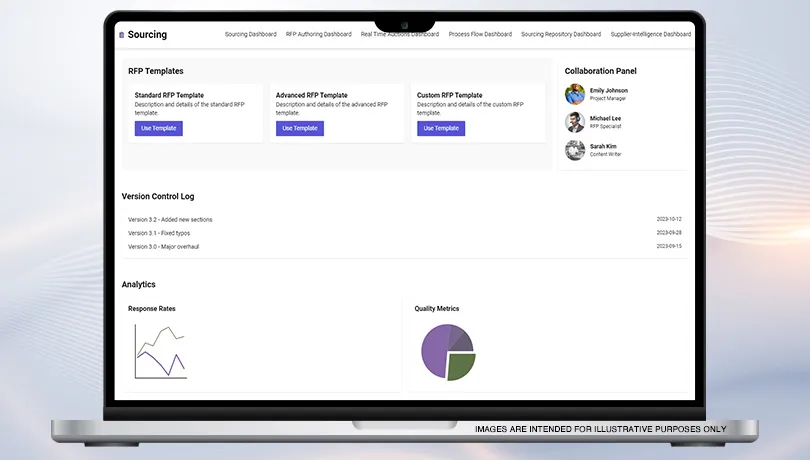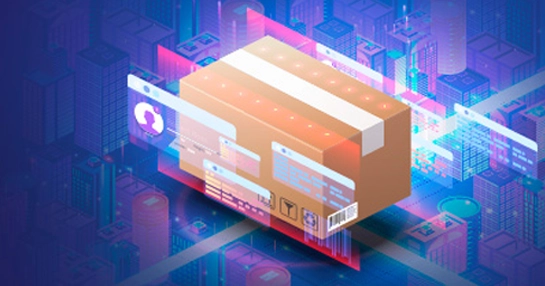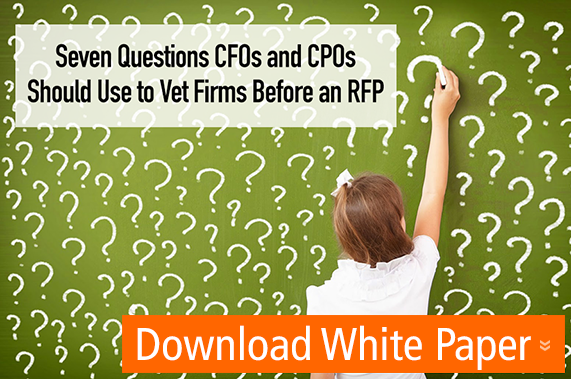Can you work closely with your internal teams and suppliers during sourcing events? What happens if you need to have a senior colleague sign off an RFP before sending it to suppliers?
With GEP SMART, you can choose who can do what in creating and publishing a request for proposal or running an auction. As a flexible sourcing software, GEP SMART allows all stakeholders to collaboratively work on RFP authoring, based on the organization’s unique sourcing workflow. Build the team around each e-sourcing event to optimize performance and drive greater savings with full oversight and audit control.

Do More with GEP SMART Sourcing and RFP Software
GEP SMART features the most powerful set of sourcing management tools available to enterprise procurement teams today. Leverage sourcing best practices and work on one unified sourcing and procurement platform native to cloud, mobile and touch technologies.
Collaborative RFP Authoring
Collaborate with colleagues to quickly build multi-line proposals and quotes with flexible forms, templates, wizards, and consistent workflows across all your business units, regions and suppliers
Supplier Intelligence
Get all the information you need about your suppliers – old and new, across categories and regions – in one place
Real-time Auctions
Stimulate more competition for your business and achieve true, up-to-the-minute market pricing on products and services with real-time auctions
Sourcing Repository
Create sourcing events quickly from best-practice sourcing templates and save the time and effort needed to launch a new RFI, RFQ, RFP or e-auction
Sourcing Dashboards
Get a 360-degree view of all the sourcing activities and events across the enterprise. Evaluate performance against your sourcing strategy
Seamless Process Flow
Use GEP SMART’s in-platform analytics, pre-populated contract tools and templates to speed up the procurement cycle
SEE MORE INNOVATIVE FEATURES
Frequently Asked Questions
RFP management software addresses critical challenges organizations face when managing complex sourcing events. As procurement becomes increasingly strategic, traditional manual methods prove inadequate for handling sophisticated RFP processes.
These specialized platforms centralize all RFP activities — from requirement development to supplier evaluation — in a single digital environment. This centralization eliminates version control issues, improves collaboration across stakeholders, and creates an auditable record of the entire sourcing process.
The software standardizes evaluation methodologies through configurable scoring frameworks, ensuring consistent supplier assessment while reducing subjective decision-making. Automated workflow capabilities streamline approvals, notifications, and deadline management.
Analytics capabilities provide deeper insights into supplier responses, identifying patterns across proposals that might be missed in manual reviews. This data-driven approach enhances decision quality and negotiation leverage.
For organizations managing multiple concurrent sourcing events, RFP software significantly reduces administrative burden while improving process compliance, cycle times, and sourcing outcomes.
An RFP enables suppliers to demonstrate their product’s USP that might be of special interest to a prospective client. RFPs enable better decisions for enterprises efficiently. There are advanced AI-driven software suites that make the process even easier and foolproof.
An RFP software first and foremost enables users to add senior colleagues as approvers who actually can sign off an RFP before they can send it to the suppliers. It should also let users add another team member as an evaluator to evaluate and score the supplier responses.
One of the biggest advancements in modern RFP management is the ability to leverage data analytics for smarter decision-making. Traditional RFP evaluations often prioritize cost above all else. Next-gen AI RFP tools take a more holistic approach.
AI algorithms analyze vendor proposals against historical performance metrics, market benchmarks, and risk factors. They assess qualitative factors — such as innovation potential, sustainability practices, and service reliability — alongside pricing.
AI systems automatically flag non-compliant proposals — whether due to environmental risks, ethical concerns, or legal shortcomings. They also cross-reference supplier data with compliance databases, ensuring all RFPs meet industry regulations.
This built-in monitoring mitigates risks while aligning procurement activities with corporate social responsibility (CSR) goals.
Finally, look for autonomous AI agents that can handle entire sourcing cycles — from drafting documents to negotiating contracts — with minimal human intervention. By learning from past projects and market trends, they will deliver unmatched efficiency and precision.
RFP software delivers transformative advantages that extend beyond mere efficiency gains, creating strategic value throughout the sourcing lifecycle. Organizations implementing these specialized platforms typically experience multiple tangible benefits, including:
Process Acceleration: RFP software dramatically reduces cycle times by automating administrative tasks, streamlining approvals, and facilitating parallel workstreams. Companies report significant time savings compared to manual processes, enabling faster time-to-market and more responsive procurement.
Enhanced Collaboration: Centralized platforms eliminate siloed communications and version control issues by providing a single environment where stakeholders across departments contribute requirements, evaluate responses, and document decisions. This unified approach ensures alignment between technical teams, business units, and procurement professionals.
Improved Decision Quality: Structured evaluation frameworks with weighted scoring criteria ensure consistent assessment across proposals. Advanced analytics capabilities identify subtle patterns across supplier responses that might be missed in manual reviews, leading to more objective, data-driven selection decisions.
Standardization and Governance: Templated workflows and approval gates enforce procurement policies and compliance requirements throughout the sourcing process. This standardization reduces risk while maintaining flexibility for different categories and requirements.
Knowledge Retention: RFP platforms create institutional memory by preserving past requirements, supplier responses, and evaluation rationales. This repository becomes invaluable for future sourcing events, preventing knowledge loss during staff transitions.
Cost Optimization: Beyond efficiency savings, improved supplier selection leads to better commercial outcomes. Organizations experience improved pricing through more comprehensive requirements development and more effective negotiation leverage.
Supplier Experience: Leading RFP solutions improve supplier experience through clearer requirements, simplified response processes, and transparent evaluation. This enhanced engagement attracts higher-quality suppliers and encourages more innovative proposals.
Performance Analytics: Comprehensive metrics provide visibility into sourcing effectiveness, supplier performance trends, and process improvement opportunities across the organization's procurement function.


























